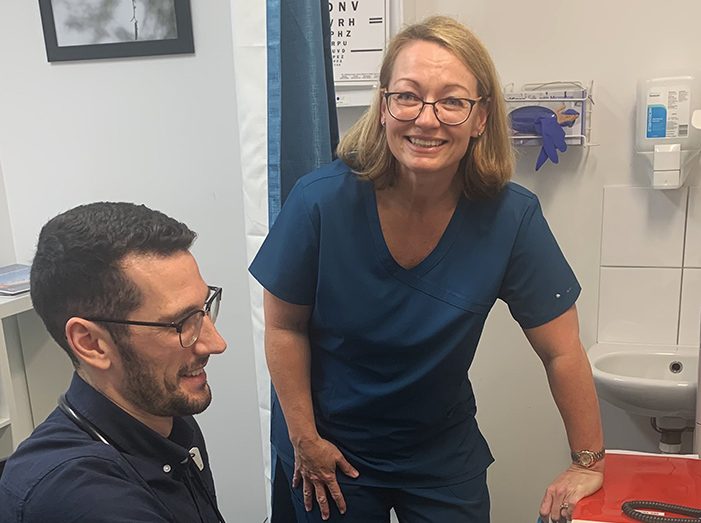
Peta recently received a recognition of service award from GPSA recognising her work over 15 years as a GP supervisor. Peta has been working at South Side Medical in McKay, Queensland since its opening in 2007. She has a drive and enthusiasm for all aspects of family medicine. She is committed to educating medical students from James Cook University and will often have them assisting her during consultations. She also mentors GP Registrars in rural and remote locations and is an examiner for JCU, RACGP and ACRRM. Peta is also a GP Supervisor for James Cook University (RACGP, ACRRM and RVTS).
Pictured: Dr Brian McPherin with Dr Peta Cornwall
What rewards do you see from GP Supervision ?
It keeps me learning and keeps me up to date with the latest developments. There is also a sense of pride I feel from seeing registers improve their skills and knowledge. It helps me to keep abreast of the latest research and keep looking things up. Unexpected questions from registrars help me to keep asking why things are done in a certain way. It also makes me realise how my thinking has changed over time. It helps me to look beyond pattern recognition and consider different possibilities in diagnosis also.
What are some of the challenges you find as a GP supervisor?
One of the challenges I find is that all registrars are different and as adult learners, they have different learning styles which I have to adapt to as a supervisor. Different personalities also respond to different ways of teaching. This can be interesting as well as challenging at times.
How have you found your experience in remote GP supervision?
Doing remote supervision I have drawn a lot on my experience working in rural and remote communities. It is important to know physically where the registrars are located, the type of patients they have, and what access they have to facilities and equipment. For instance, is it 100km to the nearest radiology centre, or is it just down the road ? Understanding geographic restraints such as this as well as getting a sense of the community can be difficult when doing remote supervision if you don’t have experiences working in remote and regional settings. By comparison, I find it much easier supervising registrars in my own clinic, as I know the environment and constraints they have to work within intimately.
Tell us about how GP supervision is different in a regional community? *
Supervising in a regional community offers additional challenges, as the practice is often smaller, with management of time being the biggest factor in being able to deliver GP Supervision. Trying to balance clinical work with supervision of registrars, it can be difficult to ensure that registrars are receiving enough supervision. There are also challenges with access to timely testing and pathology results, and a limited number of colleague GP Supervisors who I am able to discuss issues with.
Given that women are often under-represented in the GP supervisor workforce, do you feel there are any additional barriers that prevent women from becoming involved in GP Supervision? *
Most people who don’t want to become GP supervisors think they don’t have enough knowledge and are worried about the loss of income that comes with GP supervision. Perhaps women working less hours might find it difficult to justify financially the time spent in supervision. As the main earner in my household, I really had to justify to myself the personal rewards I gain from supervision to justify the loss of income from doing it. I have experienced some IMG graduates who had difficulty responding to me as a woman supervisor based on cultural differences, but ultimately they adapted to the situation as they needed my support to develop further.
How has GPSA Supported you?
I have used templates supplied by GPSA and gained access to support and contacts through GPSA. I have appreciated their advocacy for GP Supervisors in negotiating terms and conditions also. I often utilise flash cards from GPSA to start a training session, as they bring out some interesting discussions and problems. I have also used teaching plans for running sessions.
What would you say to others considering becoming a GP supervisor?
You have more to offer than you think. It’s rewarding and educational. Having a go at supervision for a day or two often gets people started. It can be fun and inspiring to have people interested in what you do. GPs sometimes get nervous about the challenges, but they are only challenges for a short time. Different registrars you encounter will inspire you again and encourage you to keep going. So give it a try.
Date reviewed: 26 March 2024
Please note that while reasonable care is taken to provide accurate information at the time of creation, we frequently update content and links as needed. If you identify any inconsistencies or broken links, please let us know by email.

GPTA Ltd t/as GP Supervision Australia
PO Box 787 Gisborne Vic 3437
Level 40/140 William Street Melbourne Vic 3000